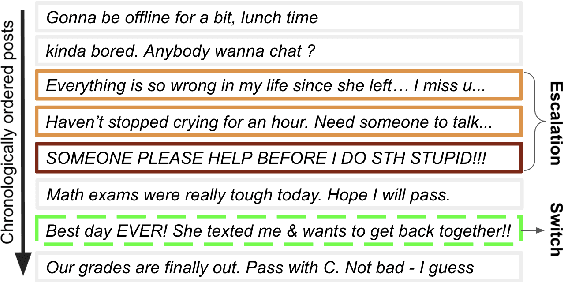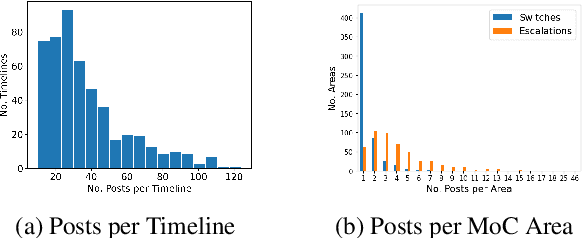Anthony Hills
Creation and evaluation of timelines for longitudinal user posts
Mar 10, 2023Abstract:There is increasing interest to work with user generated content in social media, especially textual posts over time. Currently there is no consistent way of segmenting user posts into timelines in a meaningful way that improves the quality and cost of manual annotation. Here we propose a set of methods for segmenting longitudinal user posts into timelines likely to contain interesting moments of change in a user's behaviour, based on their online posting activity. We also propose a novel framework for evaluating timelines and show its applicability in the context of two different social media datasets. Finally, we present a discussion of the linguistic content of highly ranked timelines.
Identifying Moments of Change from Longitudinal User Text
May 11, 2022



Abstract:Identifying changes in individuals' behaviour and mood, as observed via content shared on online platforms, is increasingly gaining importance. Most research to-date on this topic focuses on either: (a) identifying individuals at risk or with a certain mental health condition given a batch of posts or (b) providing equivalent labels at the post level. A disadvantage of such work is the lack of a strong temporal component and the inability to make longitudinal assessments following an individual's trajectory and allowing timely interventions. Here we define a new task, that of identifying moments of change in individuals on the basis of their shared content online. The changes we consider are sudden shifts in mood (switches) or gradual mood progression (escalations). We have created detailed guidelines for capturing moments of change and a corpus of 500 manually annotated user timelines (18.7K posts). We have developed a variety of baseline models drawing inspiration from related tasks and show that the best performance is obtained through context aware sequential modelling. We also introduce new metrics for capturing rare events in temporal windows.
 Add to Chrome
Add to Chrome Add to Firefox
Add to Firefox Add to Edge
Add to Edge